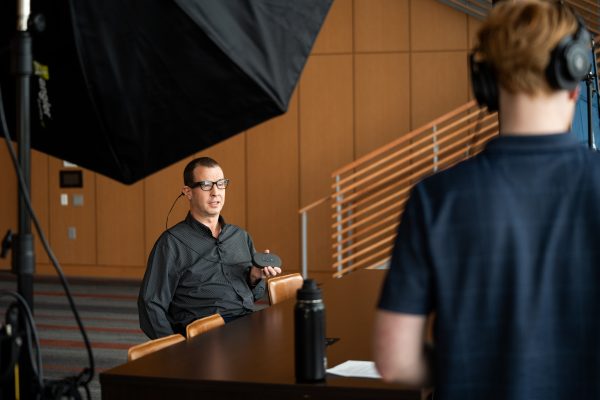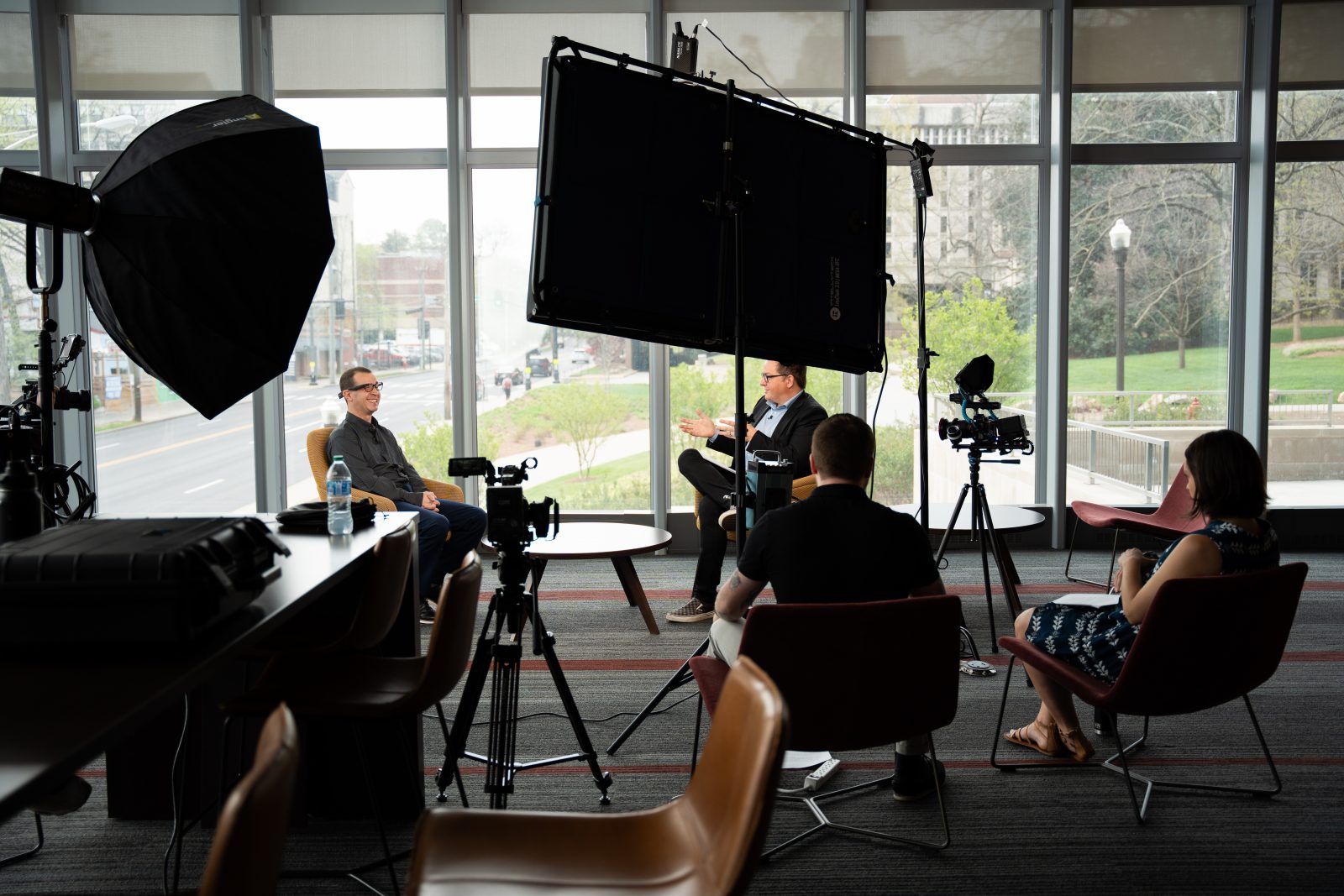In May 2023, Vanderbilt University Professor Jules White released his first generative AI online course using the Coursera platform: Prompt Engineering for ChatGPT. In the next 18 months, the university’s partnership with Coursera expanded significantly, and Vanderbilt added 13 more courses and seven “specializations.”

The Coursera content has proven popular. More than 327,000 learners have enrolled in the prompt engineering course alone, and 500,000 in total across all related courses—generating more than $1 million dollars in revenue in the first quarter of 2023.
In September 2024, Jules White, senior advisor to the chancellor on generative AI and computer science professor at Vanderbilt, received Coursera’s Innovation Award at their 12th annual conference. The award recognized his “rapid work on adoption of cutting-edge technology” through his prompt engineering course. White credited Vanderbilt’s collaborative culture for the program’s success, noting among others, his partnership with Mark Williams, professor of practice in law and co-director of the Vanderbilt AI Law Lab, to develop the Generative AI for Legal Services Primer course and subsequent Coursera specialization.
UNEXPECTED BENEFITS OF CHATGPT AND GENERATIVE AI
The impact of White’s work goes well beyond the numbers; the AI courses have brought unexpected value to learners. Consider Shawn Keen. Keen was born with glaucoma and has been legally blind since he was 21. For years, his livelihood was dependent on employers’ ability to accommodate his needs, and he struggled to find meaningful work.

Keen’s story is not unusual; in fact, 90 percent of blind adults of working age in the United States are unemployed. Rapidly advancing assistive technologies such as Envision glasses, Jaws® for Windows, braille displays and note takers have given vision-impaired people access to digital platforms and information, but competing for jobs against sighted people continues to be a challenge.
When the buzz around generative AI began, Keen wanted to know more, and he found White’s prompt engineering course on Coursera. He did not expect it to change his life.
Generative AI has one important advantage over traditional search engines: With an AI bot like ChatGPT, users can have a meaningful exchange with the technology because it remembers the entire conversation. Using only his voice, Keen can write plans, solve problems, build applications, develop processes, prepare budgets and much more.
Generative AI knowledge leveled the playing field for Keen, and he is now a sales manager for an AI company. “I want to learn all the things I don’t know, and using generative AI, a universe of knowledge can be read to me—even images and art,” Keen said. “And the course not only helped my career, it also enhanced my creativity; now I am writing stories and making AI art.”
“Shawn is a fantastic example of one of the interdisciplinary innovators in generative AI, using prompt engineering to improve accessibility,” White said. “I created the prompt engineering course with Coursera because AI will impact every part of our lives. It is critical that we teach people to use generative AI to make what was previously impossible, possible.”
Provost C. Cybele Raver agreed: “Our partnership with Coursera enables us to bring Vanderbilt’s generative AI expertise to a global audience. By equipping learners with essential AI skills, we’re advancing individual careers and pioneering the future of tech education. Stories like Shawn’s highlight the powerful impact of inclusive, accessible education.”
LEARNERS TURN AI COURSES INTO REAL-WORLD WINS
According to Coursera learners, the benefits of learning generative AI are unlimited. Dr. Lisa Traboco, a rheumatologist in the Philippines, took White’s course and is now creating scenarios and applications for clinical care using a customized version of ChatGPT that points only to their verified data to ensure accuracy—something she learned to do from White’s course.
“As a mom, I really appreciate that I can learn whenever I have time and that I can now teach AI to my kids,” Vanderbilt staffer and Coursera learner Donna Ingles said. “They won’t know a world without artificial intelligence, so I am guiding them on how to use it properly for school, which will also help them with college and their careers.”
“We deeply value the partnership with Vanderbilt as we lead the way in navigating a generative AI-fueled reality,” said Marni Baker Stein, chief content officer at Coursera. “Learners today must embrace AI to stay competitive and productive in the labor market. Through these courses with Vanderbilt, learners can drill down on AI applications and understand how to use AI to do their jobs more effectively. It is encouraging to see how learners like Shawn, Donna and Lisa are already using the skills they’ve learned to improve their lives and careers.”

VANDERBILT AND COURSERA DELIVER COMPREHENSIVE COLLECTION OF GENERATIVE AI COURSES
Following White’s success, Vanderbilt Provost C. Cybele Raver and the Institute for the Advancement of Higher Education (AdvancED) invested in expanding and diversifying the program based on employer needs assessments and market research that identified industry, organizational and workforce skill gaps. New courses include:
- Integrating Generative AI into Project Management | Bennett Landman
- Qualitative Methods for Quantitative People (with Gen AI) | Bennett Landman
- Generative AI & Model Selection | Jesse Spencer-Smith
- History & Relevance of the Rise of Gen AI | Jesse Spencer-Smith
- From Data to Decisions: Getting Started with Gen AI | Will Doyle
- From Data to Decisions: Finding Patterns with AI | Will Doyle
- From Data to Decisions: Making Predictions with AI | Will Doyle
The full collection of Vanderbilt generative AI courses is available online.
Bennett Landman, director of VALIANT and professor of electrical and computer engineering, shared his enthusiasm for the growing Coursera library of courses. “Developing this MOOC [massive open online course] has been an exciting opportunity to step outside of my regular comfort zone of individual mentorship and classroom teaching to share my love for data-driven project management using emerging tools,” Landman said. “My goal is for folks to walk away with actionable insights that they can immediately apply to their teams and workflows, helping them to be more agile, innovative and forward-thinking … all while being empowered to make decisions for themselves and not passing off responsibility to AI.”
Vanderbilt faculty can reach Coursera’s global audience of 155 million learners by creating a MOOC through AdvancED, which provides instructional designers and digital media experts to develop high-quality, short-form courses. Faculty that participate in the program may also join Coursera’s international communities of instructors to collaborate on course content and design. Interested faculty should complete this brief form.
The Vanderbilt collection of Coursera generative AI courses is available free of charge to Vanderbilt faculty, students and staff.
